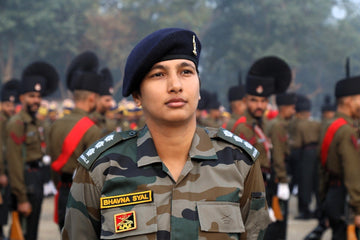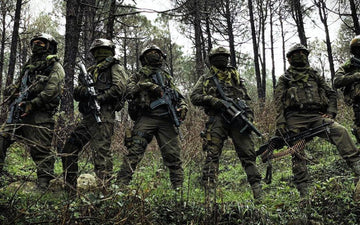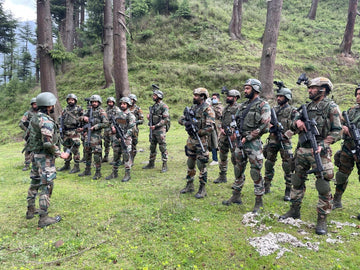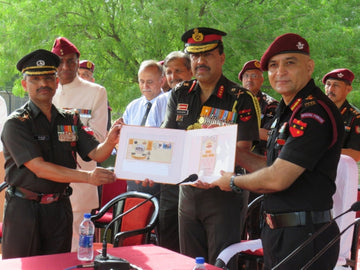The role of a Captain in the Indian Army is one of profound significance, marked by a blend of leadership, operational responsibilities, and strategic oversight. Captains are not only integral to maintaining discipline and morale within their units, but they also play pivotal roles in tactical decision-making, training, and the overall welfare of their soldiers. In this context, the Captain embodies the bridge between senior officers and the larger ranks, wielding authority and responsibility that profoundly impacts the operational effectiveness of their military unit.
Historical Context
Understanding the position of a Captain within the Indian Army requires a glimpse into its historical backdrop. The rank of Captain has deep roots, originating from the European military traditions and evolving through centuries of conflict and peace. The role has transitioned from a battlefield commander of small units in ancient warfare to a crucial managerial and strategic leader responsible for modern combat environments and peacekeeping operations.
The Indian Army, established during the British colonial period in the 19th century, underwent significant restructuring post-independence in 1947. As the army matured, the role of the Captain adapted to meet new challenges, encompassing not only traditional battlefield leadership but also modern administrative and operational duties. Today, Captains are tasked with nurturing the next generation of soldiers while ensuring mission readiness through effective training and welfare practices.
Leadership and Command
One of the primary responsibilities of an Indian Army Captain is to command a company, which typically consists of approximately 100 to 150 personnel. This position comes with a significant set of powers and duties aimed at ensuring the unit operates smoothly and efficiently.
- Command Authority: A Captain holds a commission from the President of India, which grants them the power to issue orders to all personnel under their command, including Lieutenants, Junior Commissioned Officers (JCOs), Non-Commissioned Officers (NCOs), and Other Ranks (ORs). This authority is crucial for maintaining discipline, operational effectiveness, and morale within the unit.
- Welfare and Discipline: Captains are responsible for their troops' overall welfare and discipline. They cultivate an environment where soldiers feel supported, ensuring their physical and psychological needs are met. This is particularly important in building trust and fostering a culture of mutual respect within the company.
Operational Decision-Making
In combat scenarios or field operations, the ability to make quick and effective decisions is vital. Indian Army Captains must act decisively to achieve mission objectives.
- Tactical Decisions: Captains analyze real-time information to adapt their strategies as situations evolve. For instance, during an operation, a Captain might order a change in formation or tactics based on enemy movements, maintaining the element of surprise and operational cohesion.
- Coordination and Communication: Captains are crucial in coordinating with other units and higher command during operations. Effective communication ensures that all parts of the unit work harmoniously toward a common goal. This role often involves reporting situational assessments, requesting reinforcements, or reallocating resources based on mission needs.
Training Oversight
Training is fundamental to the operational readiness of any military unit, and Captains play a central role in this aspect.
- Program Development: Captains are responsible for designing and implementing training programs tailored to meet the specific needs of their units. This includes physical training, combat drills, and technical skills development.
- Maintaining Standards: Regular evaluations and assessments are essential. Captains ensure that their soldiers are consistently appraised on their skills and performance, allowing for personalized feedback and recognizing outstanding contributors.
Administrative Control
Beyond their combat duties, Captains also manage significant administrative responsibilities.
- Personnel Management: They oversee personnel records, including performance evaluations and disciplinary matters. This attention to administrative detail ensures the smooth operation of the company and facilitates necessary promotions and assignments.
- Logistical Coordination: Captains manage logistical operations, including the procurement of equipment, rations, and supplies essential for their unit’s functioning. This logistical oversight is vital for ensuring troops are well-equipped and prepared for any scenario.
Disciplinary Powers
Discipline is the backbone of military effectiveness, and Captains wield authority in enforcing these standards.
- Enforcing Disciplinary Measures: Captains have the power to address minor infractions through various means, including verbal reprimands or assigning extra duties as a corrective measure. For more serious violations, formal disciplinary proceedings may be initiated, showcasing the Captain's significant role in maintaining order and discipline within their units.
- Initiating Serious Proceedings: In cases of severe misconduct, Captains have the authority to recommend punishments that may escalate to the Commanding Officer (CO) for additional action. This capability is essential for sustaining unit integrity and discipline.
Welfare Advocacy
Captains serve as advocates for their soldiers, ensuring their rights and welfare are prioritized.
- Addressing Concerns: Captains raise issues regarding soldiers’ living conditions, equipment quality, or morale with higher command. By acting as a liaison, they ensure that the concerns of their troops are heard and addressed.
- Enhancing Morale: Efforts to foster positive morale and welfare within the unit often lead to higher performance and loyalty among soldiers. Captains can introduce initiatives aimed at boosting unit cohesion and team spirit, promoting a healthy work environment.
Mentorship
The mentorship role is an integral aspect of a Captain’s duties, impacting future leaders.
- Guiding Junior Officers: Captains provide essential guidance to junior officers, helping them navigate their responsibilities effectively. This mentorship is paramount for leadership development and ensuring the continuity of military effectiveness.
- Shaping Professional Development: By mentoring their subordinates, Captains nurture the next generation of military leaders, instilling values, skills, and knowledge crucial for success in the armed forces.
Case Studies: Real-world Applications
To illustrate the multifaceted role of a Captain in the Indian Army, consider the example of a Captain leading troops during a humanitarian assistance mission.
Operation Rahat
During Operation Rahat in 2013, the Indian Army was mobilized to rescue thousands of stranded individuals in Uttarakhand due to severe flooding. Company Captains played crucial roles in planning rescue operations, coordinating with local authorities, and ensuring that soldiers were well-trained in emergency response tactics. The ability to adapt rapidly and effectively direct their teams in such high-pressure situations highlighted the importance of the Captain's role in operational success.
Statistical Data and Research Insights
Recent studies highlight the critical nature of effective command within military formations. Research indicates that units led by capable Captains demonstrate higher performance metrics, including mission success rates and lower post-deployment transition challenges.
- Leadership Impact: Statistics from military surveys show that units with strong leadership report a significant decline in operational anxiety and increase in cohesion. This demonstrates the direct correlation between a Captain’s leadership style and their unit's effectiveness.
Challenges and Solutions
Despite their extensive range of responsibilities, Captains face unique challenges that can impede operational effectiveness.
Key Challenges
- High Operational Pressure: Captains often operate under tremendous pressure during critical missions, requiring them to make quick decisions with far-reaching consequences.
- Resource Constraints: Limited resources can hinder a Captain's ability to train troops effectively or maintain morale.
Proposed Solutions
- Leadership Training: Continuous leadership development programs tailored to the unique challenges faced by Captains can equip them with advanced decision-making tools.
- Resource Management: Enhanced logistics planning and support systems can alleviate resource constraints, allowing Captains to focus on their primary duties rather than administrative burdens.
Future Trends and Predictions
As the dynamics of warfare evolve, the role of a Captain will also adapt to meet new challenges. With advancements in technology and shifting operational requirements, the demand for Captains skilled in technological integration and cyber warfare is increasing.
- Emphasizing Technology: Future training programs may require Captains to develop a strong understanding of digital communication systems and new battlefield technologies, ensuring they remain effective leaders in contemporary warfare.
- Enhanced Collaborative Roles: The emphasis on joint operations among various arms of the military could see Captains taking on greater collaborative roles, necessitating advanced negotiation and coordination skills.
Conclusion
In conclusion, the rank of Captain in the Indian Army is not merely a title but a critical position that encompasses a wide array of responsibilities essential to military effectiveness. From leadership and operational decision-making to training oversight and welfare advocacy, Captains serve as the backbone of their units. As challenges evolve and new operational paradigms emerge, the role of a Captain will undoubtedly remain pivotal in shaping the future landscape of the Indian Army.
For those aspiring to become Captains, or those interested in understanding the military framework better, comprehensive preparation is crucial. Engaging with resources such as SSBCrack and SSBCrackExams, which provide extensive materials and recommended readings, can equip future officers with the knowledge needed to excel in their roles. Understanding the multifaceted nature of a Captain’s responsibilities is essential for those committed to serving with honor, discipline, and dedication.





